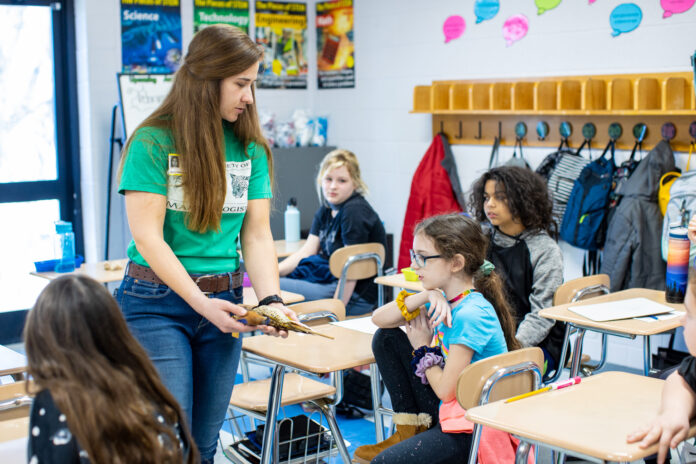 Clarksville, TN – On a cold February morning earlier this year, several Austin Peay State University (APSU) professors, staff members, and students visited Moore Magnet Elementary School to continue a burgeoning partnership between the two schools.
Clarksville, TN – On a cold February morning earlier this year, several Austin Peay State University (APSU) professors, staff members, and students visited Moore Magnet Elementary School to continue a burgeoning partnership between the two schools.
During this trip, three main Austin Peay State University representatives – Michelle Rogers, a principal investigator from APSU’s Center of Excellence for Field Biology; Alexandra Wills, director of APSU’s Community Engagement & Sustainability office; and Olivia Herron, APSU’s sustainability coordinator – visited the school’s third-, fourth- and fifth-graders to teach the students about birds.
“You can do this at home if you want,” Rogers told Elisabeth Stoudemire’s fifth-grade class. “Birds need a lot of the same stuff that you do. They need food. They need water. They need shelter. They need a place to raise their young just like your mom and dad have a house where they take care of you.”
Rogers – who helped the students establish a feeding area outside the school – discussed how birds are attracted to nearby creeks, trees, grass, and shrubs to provide their food, water, and shelter.
She discussed with the students the types of food birds eat and where they find and eat that food, and she talked about how to identify birds – including how to tell if they’re nestlings, fledglings or adults.
But the highlight of the class was when Rogers and her APSU helpers – student Olivia Cunningham and Jessica Grady, biological collections manager for the Department of Biology – passed out binoculars for the Moore students to practice using. The office of Community Engagement & Sustainability used grant money to buy the binoculars for these types of outreach efforts.
“Binoculars are fun and the best tool for looking at birds,” Rogers told the class as they peered through the lenses to identify bird specimens from across the room. “Here’s what you have to keep in mind, when you go outside, you’ll see a bird sitting on a branch, and then it’ll move. This is why binoculars take a lot of practice.
“If you look over and find something really quick, that’s what you have to learn to do over and over, and it’s harder when things change distance,” she added.
Working with the Community

Austin Peay State University continues its outreach in Clarksville and beyond. Here are a few recent examples:
- Last fall, Drs. Donna and Philip Short, who run APSU’s Jack Hunt STEM Center in the Eriksson College of Education, led a master’s-level class that provided free STEM lessons to Moore Magnet.
- The APSU’s Community Engagement & Sustainability office partnered with the Center of Excellence for Field Biology to host a family-focused Great Backyard Bird Count event on February 19th.
- Austin Peay State University’s Center of Excellence for the Creative Arts (CECA), with support from the Heydel Family Foundation, has sponsored free, professional-level arts experiences for K-12 students in the Clarksville-Montgomery County School System. CECA this school year has sponsored students’ tickets and bus transportation to the Roxy Regional Theatre and has brought the Nashville Opera to six elementary schools for live performances (and an additional nine elementary schools for virtual performances).
And Rogers continues her work with Moore Magnet teachers, making sure they have access to materials and expertise.
“We can provide a lot of support to them,” she said. “We have access to native seeds and experts in water quality and the plants and animals that live here.”



